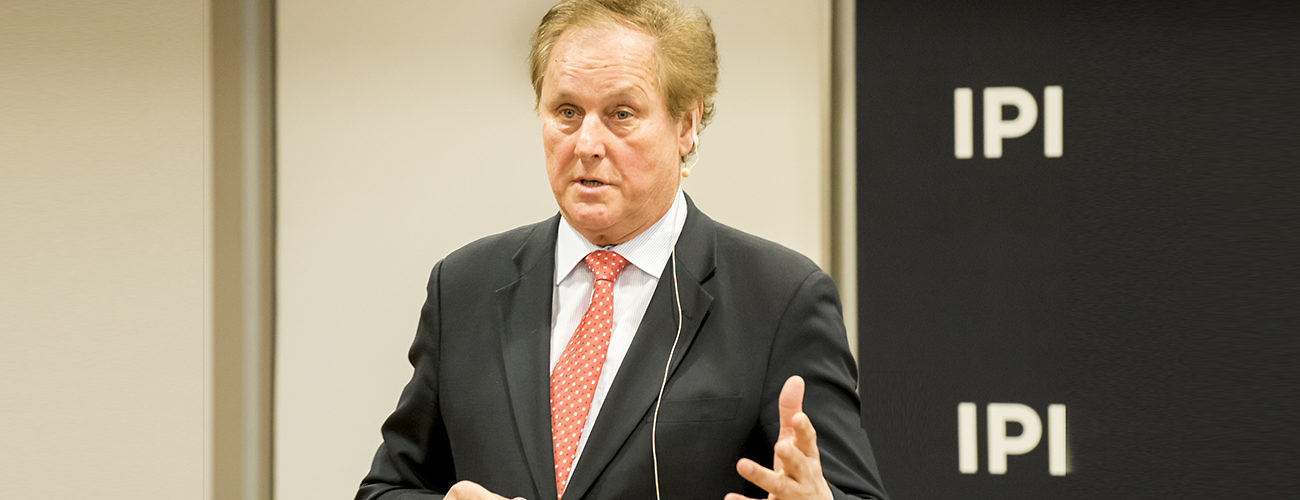Addressing a Distinguished Author Series audience at IPI on February 26th, writer William Drozdiak listed three key elements of postwar governance that had brought peace and prosperity to Europe—a continent, he noted, once better known for producing world wars. The three were a common currency, the free passage across national borders of goods and people, and an embrace of democracy.
“Unfortunately,” he added, “these three projects have recently all gone off the rails, and Europe is now as fragmented as ever.”
In the analysis of Mr. Drozdiak, author of Fractured Continent: Europe’s Crises and the Fate of the West, the financial crisis of 2008 undermined the effectiveness of having one currency for countries with unequal economies, the abrupt arrival in Europe of hundreds of thousands of refugees from Middle East wars strained the notion of relaxing borders and diversifying populations, and disillusioned European voters are now empowering illiberal parties and political leaders who are turning their backs on democracy.
“Identity politics are an important factor with people saying, ‘I lost a sense of my own country,’” he said. “Whether it is for economic reasons or because there are too many refugees or Catalonian separatism, there is a powerful backlash against globalization, producing a ‘lost generation’ of people who cannot get steady work, cannot start families and can end up living with their parents even after they are 40 years old.”
And compounding the problem, he said, is a dangerous lapse in the transatlantic alliance due to President Trump’s policy decision to treat Europeans “not as strategic allies but as commercial enemies.” As a result, he said, there is a growing tendency among European politicians to reduce their dependence on the United States.
On the Continent itself, there is disunion caused by countries like Hungary and Poland that have severely curbed press freedom and compromised the political independence of their judiciaries as well as declaring their hostility, sometimes on racial and religious grounds, to immigration. Mr. Drozdiak cited a study that showed that Germany alone will need 400,000 immigrants a year for the next 25 years to account for demographic shrinking and maintain an adequate workforce. “So using these racist arguments is going to come back to hurt Europe economically,” he said.
With Britain scheduled to depart the European Union officially in 2019, Poland will soon become the fifth largest economy in Europe, but there is rising irritation with the country, which receives 5 billion euros a month from the EU and yet is resisting refugee quotas and failing to protect basic freedoms enshrined in the EU. There are suggestions in Brussels that the EU should take action against its recalcitrant members like Poland and Hungary. One proposal Mr. Drozdiak cited would take away their voting rights and another would divert funds from their national budgets to countries that agree to accept their allotted number of refugees.
On the positive side, Mr. Drozdiak noted that European economies are all growing again and that the new President of France, Emmanuel Macron, was emerging as a forceful leader at home and influential supporter of the EU, whose traditional champion, German Chancellor Angela Merkel, has been embattled by criticism over her having allowed more than a million Syrian refugees to settle in Germany in 2015.
This reappearance of French-German joint leadership, the original partnership behind the creation of the EU, is particularly welcome to EU supporters at a time when leaders like Ms. Merkel have declared that Europeans can no longer look to the United States for their security and must increasingly manage their own destiny.
“I came away from two years of reporting this book seeing that people have a profound desire to be governed by their own communities—and not by Brussels there or by Washington here,” he said.
Asked to speculate on Europe’s future, Mr. Drozdiak said, “The most optimistic view I have is to see European institutions deepen the most important and fundamental elements such as the customs union and trade, and forego, at least for the time being, some of the more grandiose ideas like a common European foreign policy or a common European army and get back to focusing on what is most important for their citizens.”
IPI Senior Adviser for External Relations Warren Hoge moderated the discussion.








